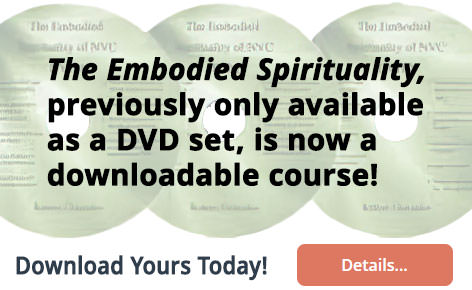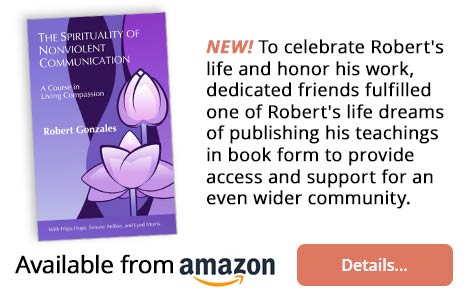

Welcome to the Robert Gonzales Training Legacy. Here you can learn more about Robert and the powerful teachings he dedicated his life to. NVC Academy is proud to house and share with you the complete body of his life's work. We invite you to explore, learn, and help keep his legacy alive!
Robert's passion was in the spirituality of the Nonviolent Communication (NVC) process. He saw NVC both as a process that helps people connect more authentically with themselves and others, and as a spiritual practice and way of living. The worldwide NVC community mourned when Robert died in 2021. He left behind a legacy of work that emerged from a lifetime of inquiry into the intersection between spirituality and human communication. More about Robert.
Trainer Tip
4 - 6 minutes
When outraged or resigned over polarized issues, pause to ask yourself who may be benefiting from this conflict? What are we not paying attention to that’s even more important? What matters most? Am I being distracted away from something more important? What do I really want? Where can I choose to focus attention and action for the wellbeing of all life on the planet (which is also my wellbeing and the well being of those I love)?
Details...Practice Exercise
3 - 5 minutes
Research shows that couples with a secure bond experience arguments that are shorter, lower in intensity, and easier to recover from. Building and keeping a secure bond with your partner requires mindfulness and consistency: respond to what’s needed or supportive in a given moment; give them your full attention and affection in a spacious greeting; conveying care, consideration, and that they matter and are seen.
Details...Article
17 - 25 minutes
When we have privilege, we can have access to resources resulting from legal or social norms related to membership in a group -- independent of any (in)action, awareness of the disparity, the potential benefits to us, or the costs to others. Unhelpful ways of engaging with privilege are: denial/invisibility, guilt/shame, defensiveness, and entitlement. Helpful ways of engaging are: owning privilege, learning about privilege, opening to feedback, and stewarding privilege for benefit of all. To be helpful we need to engage with necessary (rather than unnecessary) discomfort.
Details...Trainer Tip
1 - 2 minutes
Trainer Tip: The surest way to enjoy life is to do things that meet your needs. If you don’t enjoy a particular activity, consider the need you hope to meet by doing it. For instance, for each item you want to do consider the needs you're trying to meet. Connect to the joy of that need. Then for each ask: “How would I feel if I delayed finishing this item?”. Consider which items you want to continue, pause, or reprioritize. This can help increase life enjoyment.
Details...Practice Exercise
4-6 minutes
Making decisions from overwhelm can be costly for you and others. Instead, to get distance name overwhelm as it comes. Apply self-compassion. Be suspicious of your impulse to withdraw. Find ways to meet your needs. Tell others about your overwhelm. This may allow more support, connection and trust-building. Plan what to do to meet your needs next time you're overwhelmed. Tweak your plan.
Details...Article
4 - 6 minutes
Many people consider a true observation as something that all can agree on. Some people use the video camera analogy – a true observation is “what a video camera can see and hear.” This perpetuates the myth of the neutral, unbiased observer. There are three layers of observation: External, Internal, and Systemic. Understanding these layers is key to connecting with the depth of the needs, and to create greater shared understanding.
Details...Audio
5 - 7 hours
Transforming organizational culture requires attention and change at the systemic level. Learn which systems are crucial for any organization to establish and clarify whether that organization is collaborative or not, and then learn how to create and strengthen a collaborative organization.
Details...Practice Exercise
5 - 8 minutes
There are ways to reduce obstacles to setting boundaries. Notice unconscious ways you sacrifice yourself in order to avoid boundary setting. List of signs that a life-serving boundary is needed, but you're denying this. Realizing you consistently abandoned your needs may require time to process and mourn before you can set boundaries consistently. With practice, you can recognize boundaries care for yourself and others.
Details...Practice Exercise
4 - 6 minutes
One way of simplifying decision-making in relationships is clarity about the level of contact and connection you want with the people you interact with. This means knowing what you want and don’t want to share, the kinds of activities you do and don’t do together, how often, etc. This can help you chose how to best support your needs in that context, and help you to remember to set life-serving boundaries when you need them.
Details...Practice Exercise
4 - 6 minutes
Setting boundaries takes being firmly grounded in self-respect and clear about what works for you. This means making conscious choices about how you relate to another or behave in a situation. Such clarity allows you to put your attention and energy where you want it to go. Thus we can have care and compassion without taking responsibility for others, nor feeling guilty when we say “no”. This takes awareness, skills, practice, healing and compassion.
Details...

